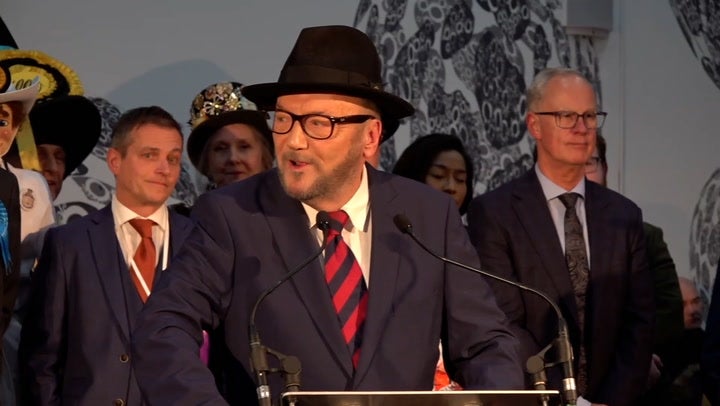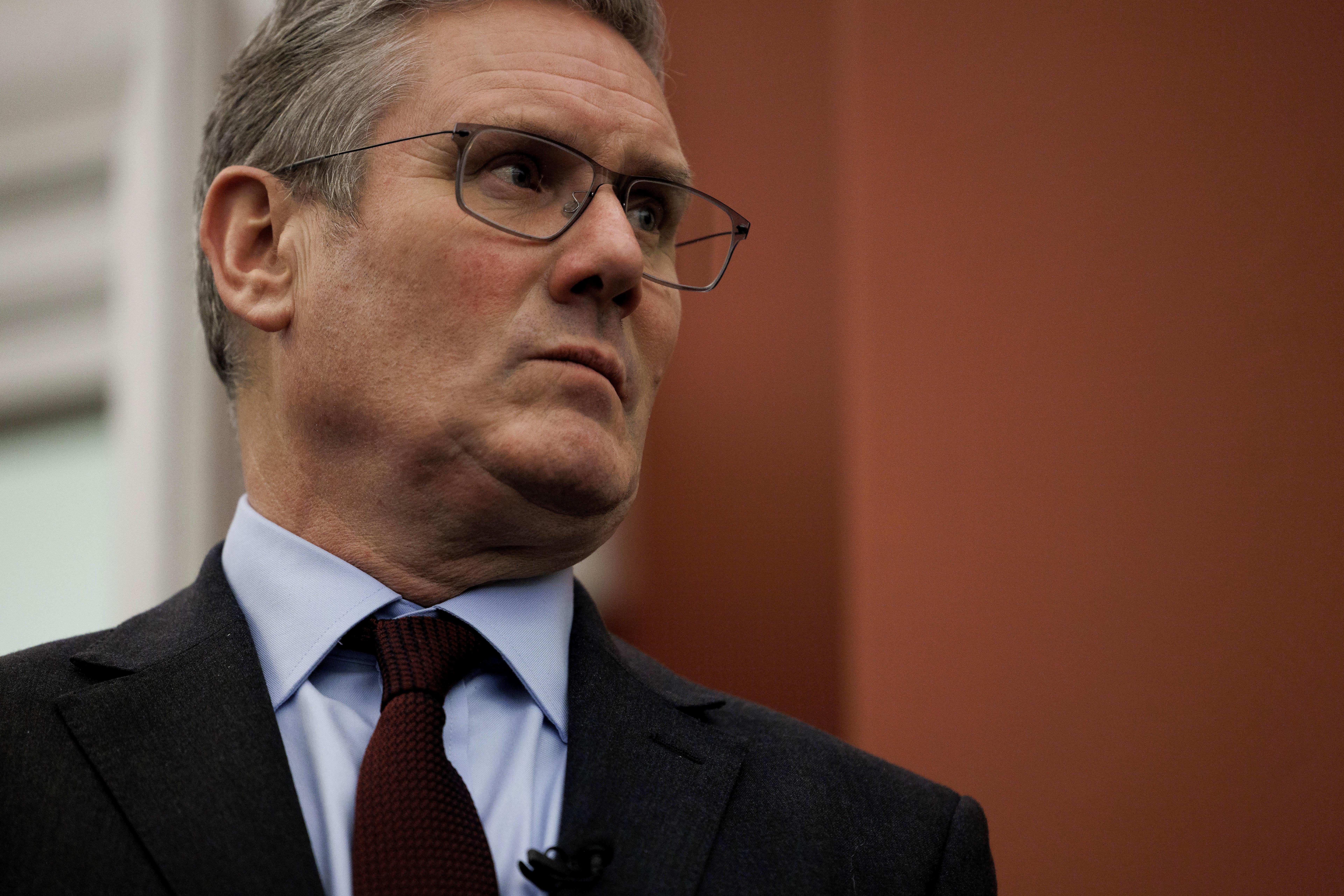Rishi Sunak warns British democracy being targeted by far-right and Islamists
Prime minister responds to ‘beyond alarming’ Rochdale by-election result that saw George Galloway win shock return to Westminster
Rishi Sunak has said democracy is under attack from far-right and Islamist extremists as he urged the country to unite to beat the “poison”.
In an extraordinary move, the prime minister used a hastily arranged press conference outside No 10 yesterday to announce a new crackdown on extremism and appeal to the public to face down those he said were “trying to tear us apart”.
Just hours after George Galloway’s victory in the Rochdale by-election, he said it was “beyond alarming” voters had backed a candidate who “dismisses the horror of what happened on October 7”, when Hamas murdered 1,200 people in Israel.
Earlier, the Board of Deputies of British Jews condemned Mr Galloway’s win as a “dark day” for the UK’s Jewish community, while Labour apologised for not campaigning against him in Rochdale.
Mr Sunak announced ministers would redouble support for the anti-terrorism Prevent programme, demand universities stop extremist activity on campus and prevent people entering the UK whose “aim is to undermine its values”.
In remarks likely to be seen as more controversial, Mr Sunk also urged the public to reject when extremists ”claim that Britain is and has been on the wrong side of history”.
He said: “No country is perfect, but I am enormously proud of the good that our country has done.
“And when these groups… tell children that the system is rigged against them or that Britain is a racist country… This is not only a lie, but a cynical attempt to crush young dreams, and turn impressionistic minds against their own society.”
Home secretary James Cleverly has also been instructed that those in the UK on visas who choose to “spew hate” will have their right to be in the country removed.
The Labour leader backed Mr Sunak’s intervention, saying: “The prime minister is right to advocate unity and to condemn the unacceptable and intimidatory behaviour that we have seen recently.”
But Conservative peer Lord Vaizey said “many in the Tory party should look to themselves” when it comes to the toxification of public life after accusations it has stoked division on issues from Brexit to asylum seekers.
Labour also lashed out at the new MP as someone who is “only interested in stoking fear and division”.
The party had dropped its own candidate for making antisemitic remarks, leaving the door open for Mr Galloway, an alleged antisemite notorious for stoking division and courting controversy.
Sir Keir Starmer said following the result: “Galloway only won because Labour didn’t stand a candidate. I regret that we had to withdraw a candidate and apologise to voters in Rochdale. But I took that decision. It was the right decision.
“And when I say I changed the Labour Party, I mean it. Obviously we will put a first-class candidate, a unifier, before the voters in Rochdale at the general election.”
A Labour spokesperson added: “Rochdale deserved the chance to vote for an MP that would bring communities together and deliver for working people.
“George Galloway is only interested in stoking fear and division. As an MP he will be a damaging force in our communities and public life.”

As the implications of Mr Galloway’s return to parliament became clear:
- The Board of Deputies of British Jews said it was a “dark day” for the UK’s Jewish community
- Mr Sunak said the campaign for the Rochdale by-election was “one of the most divisive in recent times”
- Senior Tory MPs called for politicians from all sides of the spectrum to stop inflaming public tensions
- Greater Manchester mayor Andy Burnham said Labour had “let the people of Rochdale down”
- Mr Galloway said the “zionist apartheid state of Israel” has no right to exist
- His deputy, former Labour MP Chris Williamson, refused to condemn the Hamas 7 October terror attacks
Mr Galloway’s Workers Party of Great Britain won with just under 40 per cent of the vote, a majority of 5,697 over second-placed David Tully, a local businessman and independent candidate.
In his victory speech, Mr Galloway said: “Keir Starmer, this is for Gaza.” It echoed the message Mr Galloway sent upon his 2005 win in the Bethnal Green and Bow constituency, when he said: “Mr Blair, this is for Iraq.”
He added: “You have paid, and you will pay, a high price for the role that you have played in enabling, encouraging and covering for the catastrophe presently going on in occupied Palestine in the Gaza Strip.”
A spokesperson for the Board of Deputies of British Jews said: “George Galloway is a demagogue and conspiracy theorist who has brought the politics of division and hate to every place he has ever stood for Parliament.
“His election is a dark day for the Jewish community in this country and for British politics in general.”
Meanwhile, a spokesperson for the Campaign Against Antisemitism said: “George Galloway is an inflammatory firebrand with an atrocious record of baiting the Jewish community.
“His endurance in our public life serves to exploit extremist sentiment and divide communities.”
Asked if Mr Galloway’s election win would inflame tensions, the prime minister said: “It was very concerning to see the reports of intimidation through the by-election, and by all accounts one of the most divisive campaigns that we’ve seen in recent times."
And in a sign of the controversy to come after Mr Galloway’s return, his deputy yesterday morning refused to condemn the 7 October Hamas terror attacks on Israel.
Former Labour MP Chris Williamson, who was suspended from the party for claiming it had “given too much ground” and been “too apologetic” in tackling antisemitism, is now the deputy leader of Mr Galloway’s Workers Party of Britain.
The Jeremy Corbyn ally told BBC Radio 4’s Today programme: “You can’t expect to live in a situation where people have been oppressed for 75 years and not expect a reaction.”
He added: “In international law, oppressed peoples have an absolute right to armed resistance,” before going on to claim that the majority of those innocent people killed on 7 October were killed by Israeli forces.
Labour’s deputy national campaign coordinator Ellie Reeves said she was “utterly appalled by Mr Williamson’s failure to condemn Hamas attacks on the seventh of October, and likewise his failure to distance his party from the endorsement of [former president of the far-right British National Party] Nick Griffin”.
And, in comments likely to further inflame tensions amid Israel’s war on Gaza, Mr Galloway went on to tell Sky News that the “zionist apartheid state of Israel” has no right to exist.
Top Tories came together to warn tensions are already running high and stress the importance of taking the heat out of political debate.
Senior Conservative MP David Davis, who will introduce Mr Galloway alongside Jeremy Corbyn in the House of Commons on Monday, said “the temperature of politics has got very high”.
And Mr Davis said Mr Galloway serves as “a sharp reminder” that “if we want to make progress as a democracy you have to be able to debate in civilised terms and accept that other people have real differences from you”.
The former cabinet minister told The Independent: “The general temperature of politics has got very high… even intra-party as well as between parties.
“For democracy to operate properly we have to be able to reach a decision and ideally build a consensus or very solid majority around that, and that has not been happening for years.”
And former justice secretary Sir Robert Buckland said Mr Galloway’s election should was “all about divisiveness”, adding that it should serve as “a general call to arms” to take the heat out of political debate.
Speaking after visiting a sixth form college, Sir Robert told The Independent that “we owe an example to the next generation to do our politics better”.
“That does not mean no disagreement or argument, of course it means lively debate, but disagreeing agreeably as we have done in Britain for generations.”
He added: “The more we spread the language of divisiveness and otherness and hate, the more you’ll see politicians like Jo Cox losing their lives or David Amess losing their lives, and the darker and sadder a place our political life will be…
“And that’s why last night was a profoundly depressing result, frankly.”
And Sir Robert described Mr Galloway as a “demagogue” who “comes and goes and leaves damage in his wake”.
And he said all sides of the political spectrum have been guilty of furthering public division and that politics should be about “solutions”, not trying to “inflame” debate.
And Greater Manchester mayor Andy Burnham said Labour had “let the people of Rochdale down because it didn’t give them a good enough choice”.
And, in a warning to Mr Galloway, Mr Burnham warned that he will “stand up to anybody who seeks to bring division or hate to our city region”.

Left-wing pressure group Momentum described Labour’s Rochdale by-election results as “self-inflicted”. A spokesperson for the group said: “This was a needless and self-inflicted loss for Labour.
“First, (Labour leader Sir Keir) Starmer’s utterly factional selection processes resulted in a candidate who was clearly unfit for office. Then the Labour leadership tried to defend him as one of their own.
“Finally, Keir Starmer’s failure to stand with Gaza in its hour of need left the door open for George Galloway.
“To avoid any more damaging repeats, Starmer should end the factional abuse of Labour’s selection processes and stand up for an immediate, permanent ceasefire in Gaza.”
The Rochdale campaign has been mired in controversy and claims of intimidation and divisive tactics.
Labour withdrew support for its candidate, Azhar Ali, after a recording emerged in which he claimed Israel was complicit in the terrorist attacks of 7 October, seeing Mr Galloway become the firm favourite for the seat.
Mr Ali remained listed as the Labour candidate as the party’s decision came too late for ballot papers to be changed.
Labour said it “will quickly begin the process to select a new Labour candidate for the general election”.
Nigel Farage’s Reform UK also suffered a poor result in the seat, gaining just 6 per cent of the vote, much lower than its national poll rating of around 10 per cent. Leader Richard Tice claimed his candidate, former Rochdale MP Simon Danczuk, had received a death threat during the campaign and said his party’s campaign team had been subject to “daily intimidation and slurs”.
Pollster Luke Tryl, of More in Common, said the results were “terrible” for all the main parties. He pointed to the performance of second-placed Mr Tully as almost more significant than Mr Galloway’s win.
“But the circumstances mean it is far more likely the lesson here is one about candidate selection and due diligence than about public opinion more broadly,” he added.
Labour’s Ellie Reeves said the party will not change its position on Gaza despite Mr Galloway warning after the by-election result it will pay “a high price” nationally.
She told Sky News: “We’ve set out our position on Gaza and that was adopted by the Commons just the other week.
“We’ve said there should be an immediate humanitarian ceasefire, that the loss of life has been intolerable, there must be no ground offensive in Rafah, aid has to be ramped up into the region, and, importantly, that we need to find a two-state solution.”
Join our commenting forum
Join thought-provoking conversations, follow other Independent readers and see their replies
Comments
Bookmark popover
Removed from bookmarks